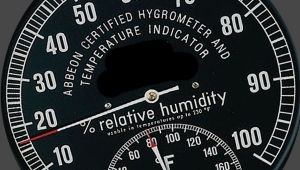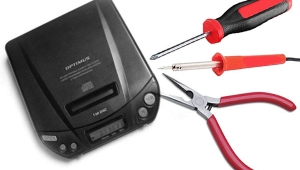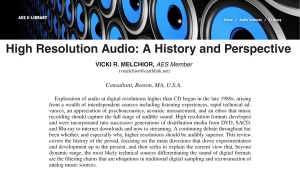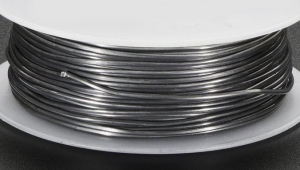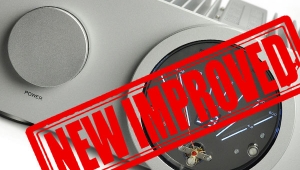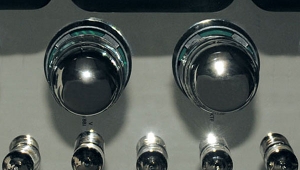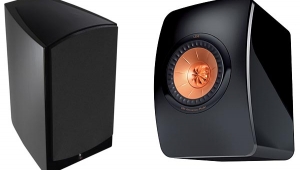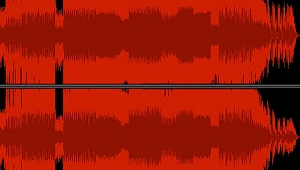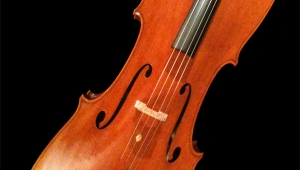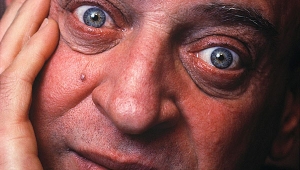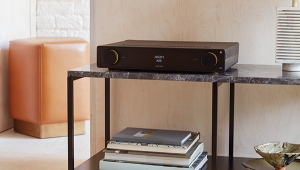| Columns Retired Columns & Blogs |
The MP3 Whirlpool
As January 1, 2000 approaches, and the MP3 whirlpool continues to swirl, one simple fact has made me feel as if I'm stuck at the starting line of the entire download controversy: The sound quality of MP3 has yet to improve above that of the average radio broadcast. Until that changes, I'm merely curious—as opposed to being in the I-want-to-know-it-all-now frenzy that is my usual m.o. when to comes to anything that promises music you can't get anywhere else.
According to Gene Hoffman, the 23-year-old CEO of Emusic.com, which sells music in the MP3 format, the quality issue will be solved in the next few years. "The quality is definitely going to improve. It's basically a bit-rate question, and getting higher bit rates is a question of bandwidth. There are several systems being developed now that will feature smaller file sizes and higher bit rates, but none are deployable just yet. And there also needs to be a continued upgrade of infrastructure.
"But 128kbps, which we're using now, is fine for most systems. I have a pair of Tannoys and a Mixmaster, and I A/B back and forth between MP3s and CDs, and while there's a little difference in sound quality, it's not much."
In one brief conversation, Hoffman's lightning intelligence more than justifies all the hyperbole he's inspired. In "E Gang," a Forbes section profiling online movers and shakers, he was compared to Linus Torvald, the Finnish programmer who started the Linux operating system ball rolling. Hoffman was also quoted as saying, "Piracy plays a role in educating our customer base."
"It does," he confirms from his office in Silicon Valley. "But what the majors call 'piracy' is really just fans trading music. Real piracy, the kind people make money on, is now dead. The Internet has made piracy much easier, but with ease of piracy has come an ease of enforcement. It's very easy to track you down on the Web."
All the music on Emusic.com is legally licensed for use. For beginners, there's an MP3 primer page, complete with links to sites where you can download either an MP3 player or RealPlayer software. The company's formula is the soul of simplicity: $1 per downloaded song, $9 for the whole album.
Two statistics from the Forbes article also tell the tale. First, "MP3" is now the most searched-for word on the Web, suddenly outnumbering the previous recordholder, "sex." Second, because their only large costs lie in licensing fees, Emusic.com can produce a CD's worth of music for about a buck. (On average, it costs major labels $4 to put a CD in the rack, which must be added to the upfront costs of the recording project.) On top of that, the majors have to take returns. Hoffman says his real cost per song is 12 cents.
The catalog available for download is what drives growth for a company like Emusic. Hoffman reckons that Emusic has acquired for downloading 7-10% of all the independent-label music out there. (The indie label market share of all recorded music stands at 21-23%, based on annual revenue.) Emusic has deals with Epitaph, Rykodisc, Taang!, Parasol, Frontier, Jewel-Paula, Ubiquity, King Biscuit, Jetset, and other labels, and their current catalog comprises more than 10,000 tracks.
One of the company's content-acquisition honchos is Jeff Price, who, with longtime Stereophile subscriber Joel Morowitz, co-owns SPINart, a New York City-based indie rock label. Running a record label—which makes opening a restaurant look like a sure thing—and negotiating deals with other labels to make their catalogs available for downloading gives him an unusual perspective.
Price first became involved with Emusic.com when its predecessor, Goodnoise.com, licensed SPINart's catalog. (Goodnoise became Emusic.com in January 1999 after taking over a pre-existing online music seller named Emusic.) At that point Goodnoise.com was small, and known primarily for its music downloads of former Pixie Frank Black, whose physical rights (ie, CDs) belonged to SPINart. According to Price, SPINart was the first label anywhere to license its entire catalog for download. With a small but discerning alternative roster that includes the Poster Children and Fastbacks, the label's biggest success is Apples in Stereo.
Price says that Emusic.com is currently entering into agreements with 10 or so new labels a week. The backlog of music needing to be digitized is what keeps all that content from appearing on www.Emusic.com the instant the documents are signed.
As a label owner, Price lists two major advantages for putting music on the Web: "First, Emusic.com pays labels a cash advance against future sales. More important, I've noticed that my physical sales—sales of SPINart CDs at traditional brick-and-mortar retail—have increased since our catalog's been on Emusic.com." This is proof to him that while people may still be gun-shy about downloading entire albums, the market for downloading single tracks—and then going out to buy the CD—is firmly established.
EMI and Sony Music have already announced plans to make their catalogs available on-line (see past stories 1,2). Still, the looming question is: When will the other major labels, who control 80% of the $14-billion-a-year US record market, enter the fray, and what will the effect be? When I ask Hoffman whether the majors consider him the Antichrist, he laughs.
"Just a little," he says. "Obviously, the majors have compelling content offerings, but they're married to the physical distribution of CDs. Will retail go away? No, [but] there are a number of things that can happen. You'll see the centralization of retailing, with several big, powerful companies emerging. Also, the mom-and-pops can do affinities—an all-classical store, for example—really well. There's also hybridized retail, where you go in and load up your MP3 player with music. At the end of the day, retail doesn't go away, but it does narrow and shift."
Hoffman anticipates that the 65 to 70 million people now downloading and playing MP3s are only the first wave.
"What we're moving to very quickly is having a central database of your music. Audio components are going to have a mega hard drive in them that reflects what's in your PC.
"What's most interesting about this is that it's copyable. Next year, Ford's coming out with cars equipped with a 60-gigabyte hard drive. In the future, you're going to be managing playlists instead of stacks of CDs."
- Log in or register to post comments

